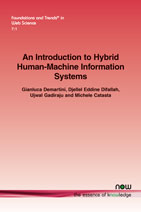An Introduction to Hybrid Human-Machine Information Systems
By Gianluca Demartini, University of Queensland, Australia, g.demartini@uq.edu.au | Djellel Eddine Difallah, Center for Data Science, New York University, USA, djellel@nyu.edu | Ujwal Gadiraju, L3S Research Center, Leibniz Universität Hannover, Germany, gadiraju@L3S.de | Michele Catasta, Stanford University, USA, pirroh@cs.stanford.edu
Abstract
Hybrid Human-Machine Information Systems leverage novel architectures that make systematic use of Human Computation by means of crowdsourcing. These architectures are capable of scaling over large amounts of data and simultaneously maintain high-quality data processing levels by introducing humans into the loop. Such hybrid systems have been developed to tackle a variety of problems and come with inter-disciplinary challenges. They need to deal with the full spectrum of challenges from the social science standpoint, such as understanding crowd workers behavior and motivations when performing tasks. These systems also need to overcome highly technical challenges like constraint optimization and resource allocation based on limited budgets and deadlines to be met. In this paper, we introduce the area of Human Computation and present an overview of different applications for which Hybrid Human- Machine Information Systems have already been used in the realms of data management, information retrieval, natural language processing, semantic web, machine learning, and multimedia to better solve existing problems. Finally, we discuss current research directions, opportunities for the future development of such systems and their application in practice.
An Introduction to Hybrid Human-Machine Information Systems
Hybrid Human-Machine Information Systems leverage novel architectures that make systematic use of Human Computation by means of crowdsourcing. These architectures are capable of scaling over large amounts of data and simultaneously maintain high-quality data processing levels by introducing humans into the loop. Such hybrid systems have been developed to tackle a variety of problems and come with inter-disciplinary challenges. They need to deal with the full spectrum of challenges from the social science standpoint, such as understanding crowd workers behavior and motivations when performing tasks. These systems also need to overcome highly technical challenges like constraint optimization and resource allocation based on limited budgets and deadlines to be met.
This monograph introduces the area of Human Computation and present an overview of different applications for which Hybrid Human-Machine Information Systems have already been used in the realms of data management, information retrieval, natural language processing, semantic web, machine learning, and multimedia to better solve existing problems. Finally, it discusses current research directions, opportunities for the future development of such systems and their application in practice.
